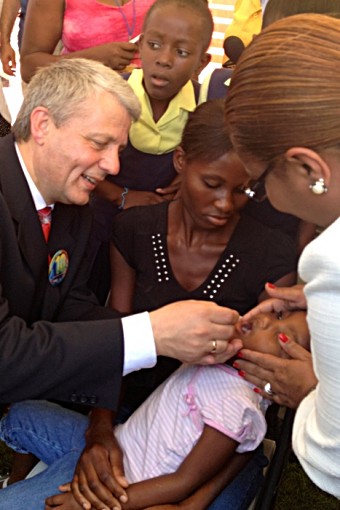
Dagfinn Høybråten
Board Chair of the GAVI Alliance

Dagfinn Høybråten vaccinating a child in Haiti during World Immunization Week,2012
World Immunization Week, which is being celebrated around the globe this week, is an important opportunity to highlight the power of immunisation in protecting children against life-threatening diseases, including rotavirus diarrhoea and pneumococcal disease, two of the leading child killers.
It is impressive and encouraging to see how governments, development partners, international organisations, manufacturers, health experts and civil society are all uniting around one important goal – universal immunisation coverage. Every child, everywhere deserves a healthy start in life. There is no reason why children in poor countries should die from vaccine-preventable diseases in the 21st century.
Although vaccines are widely available in high-income countries, the unacceptable reality is that 22 million children under five in developing countries are missing out on basic vaccines. For this reason, the GAVI Alliance is committed to working closely with countries to reach the hard to reach with vaccines – including children in remote areas and marginalised populations, and improve communities’ understanding about the health benefits of immunisation.
The good news is that, this week alone, four countries – Haiti, Somalia, Uganda and Zambia - will introduce new vaccines with GAVI support.
Over the past year, Haiti has really stepped up to the plate in making immunisation a priority after the devastations caused by the earthquake that hit its capital, Port au Prince, in January 2010.
This time last year during World Immunization Week, I was in Haiti representing GAVI at a vaccination campaign against measles, rubella and polio organized by Haiti’s Ministry of Health. It is inspiring to see that one year on the country has made great strides in rolling out the pentavalent vaccine and is now introducing the rotavirus vaccine, protecting infants from the leading cause of severe diarrhoea, which is often fatal for children under five. To date, GAVI has supported 14 countries to introduce the rotavirus vaccine and plans to reach five million children with the vaccine.
During World Immunization Week this year, political leaders and global health experts will gather in Abu Dhabi for the Global Vaccine Summit to celebrate immunisation successes, including the unrelenting efforts of the polio eradication partners over the past few years. This global push around polio eradication underscores the true power of immunisation – the idea that diseases can be literally wiped off the face of the earth.
GAVI is committed to supporting the polio “endgame” by strengthening routine immunisation services. These services are essential to complete eradication and ensure that countries remain polio free. Investing in routine immunisation programmes will not only help us deliver the full package of vaccines to children, but eradicate polio once and for all.
I am delighted to see that President Barroso and Commissioner Piebalgs of the European Commission will take part in the Summit, demonstrating the EC’s strong commitment to support immunisation. I was very pleased to meet with Bono and Commissioner Piebalgs last year in October and to discuss with the Commissioner the power of immunisation.
Scaling up immunisation programmes in poor countries would not be possible without continued support from GAVI’s generous donors, including 10 European Union member states and the European Institutions. Since 2003, the European Institutions have committed EUR 82.5 million to support GAVI’s mission of ensuring that children of the African, Caribbean and Pacific (ACP) Group receive the basic package of vaccines, including EUR 10 million for pneumococcal vaccines in ACP countries, pledged in June 2011.
We are grateful that most of GAVI’s donors provide long-term predictable funding, thereby ensuring that routine immunisation programmes are sustained with a reliable supply of quality, low-cost vaccines.
World Immunization Week is a chance to celebrate global achievements in vaccination, but also an opportunity to acknowledge how much we still need to do.
This blog post is also featured on Euractiv.
